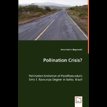Pollination Crisis? - Pollination limitation of Passiflora edulis Sims f. flavicarpa Degner in Bahia, Brazil
Pollination Crisis? - Pollination limitation of Passiflora edulis Sims f. flavicarpa Degner in Bahia, Brazil
€ 50,99
Animal pollination of plants represents a critical ecosystem service of great value to humanity. Almost all flowering plant species of tropical rain forests are animal-pollinated and one-third of the human diet in tropical countries is derived from insect-pollinated plants, so the worldwide decline in pollinators has potential consequences for the stability of crop yields. Pollination systems - such as Passiflora edulis plantations in north-eastern Brazil - are under increasing threat from anthoprogenic effects, including fragmentation of habitat, changes in land use, modern agricultural intensification, use of chemicals such as pesticides and herbicides, and invasions of non-native plants and animals. Anne-Katrin Bogdanski determined whether the observed passion fruit fields were affected by pollination limitation and the possible reasons why this may occur. Special focus was laid on the consequences of land degradation, particularly with respect to its effects on bee abundance and diversity. This book is of interest for students and scientists in the the area of ecology as well as for organisations working in the field of nature conservation and sustainable development.
| Prijs | Verzendkosten | Totaal | |
|---|---|---|---|
€ 50,99 | € 0,00 | € 50,99 |
Alternatieve producten
© 2016 - 2024 aanbiedingchecker

